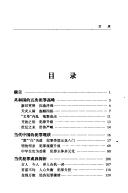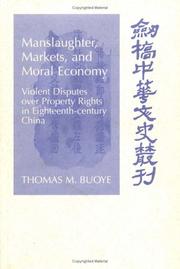| Listing 1 - 10 of 23 | << page >> |
Sort by
|
Book
ISBN: 9781433168536 1433168537 Year: 2020 Publisher: New York : Peter Lang,
Abstract | Keywords | Export | Availability | Bookmark
 Loading...
Loading...Choose an application
- Reference Manager
- EndNote
- RefWorks (Direct export to RefWorks)
S03/0633 --- S11/0730 --- S11/0816 --- China: Geography, description and travel--Shanghai (incl. concessions) --- China: Social sciences--Women and gender: since 1949 --- China: Social sciences--Criminality --- Criminelles --- Criminalité --- Justice --- Lutte contre --- Administration --- Chine --- Criminalité
Book
ISBN: 9780521173810 9780521198080 9780511762574 9781139042192 113904219X 0511762577 9781139044820 1139044826 9781139044820 0521198089 0521173817 110721503X 1139035967 1283053926 9786613053923 1139041428 1139038281 1139040650 Year: 2011 Publisher: New York Cambridge University Press
Abstract | Keywords | Export | Availability | Bookmark
 Loading...
Loading...Choose an application
- Reference Manager
- EndNote
- RefWorks (Direct export to RefWorks)
The violence of Mao's China is well known, but its extreme form is not. In 1967 and 1968, during the Cultural Revolution, collective killings were widespread in rural China in the form of public execution. Victims included women, children, and the elderly. This book is the first to systematically document and analyze these atrocities, drawing data from local archives, government documents, and interviews with survivors in two southern provinces. This book extracts from the Chinese case lessons that challenge the prevailing models of genocide and mass killings and contributes to the historiography of the Cultural Revolution, in which scholarship has mainly focused on events in urban areas.
Genocide --- S06/0435 --- S11/0534 --- S11/0816 --- Cleansing, Ethnic --- Ethnic cleansing --- Ethnic purification --- Ethnocide --- Purification, Ethnic --- Crime --- History --- China: Politics and government--Cultural Revolution --- China: Social sciences--Class studies --- China: Social sciences--Criminality --- China --- Social Sciences --- Political Science
Book
ISBN: 9783447058247 3447058242 Year: 2008 Volume: 64 Publisher: Wiesbaden: Harrassowitz,
Abstract | Keywords | Export | Availability | Bookmark
 Loading...
Loading...Choose an application
- Reference Manager
- EndNote
- RefWorks (Direct export to RefWorks)
Outlaws --- Mercenary troops --- History --- Liu, Guitang, --- S11/0816 --- S05/0221 --- China: Social sciences--Criminality --- China: Biographies and memoirs--20th century: individuals --- Bandits --- Criminals --- Brigands and robbers --- Outcasts --- Mercenaries (Soldiers) --- Troops, Mercenary --- Armies --- Non-state actors (International relations) --- Soldiers --- Foreign enlistment --- Private military companies --- Liu, Kuei-tang, --- Outlaws - China - Biography --- Outlaws - China - History - 20th century --- Mercenary troops - China - History - 20th century --- Liu, Guitang, - 1892-1943
Book
ISBN: 0835127966 7119014005 9787119014005 9780835127967 Year: 1992 Publisher: Beijing: Foreign languages press,
Abstract | Keywords | Export | Availability | Bookmark
 Loading...
Loading...Choose an application
- Reference Manager
- EndNote
- RefWorks (Direct export to RefWorks)
Juvenile delinquency --- S11/0900 --- S11/0816 --- -Delinquency, Juvenile --- Juvenile crime --- Conduct disorders in children --- Crime --- Juvenile corrections --- Reformatories --- China: Social sciences--Social pathology, social deviance (incl. infanticide, abandoned children, hoodlums) --- China: Social sciences--Criminality --- -China: Social sciences--Social pathology, social deviance (incl. infanticide, abandoned children, hoodlums) --- Juvenile delinquency - China

ISBN: 7507208931 Year: 1997 Publisher: 北京 今日中国出版社
Abstract | Keywords | Export | Availability | Bookmark
 Loading...
Loading...Choose an application
- Reference Manager
- EndNote
- RefWorks (Direct export to RefWorks)
Crime --- Criminals --- Social problems --- History --- S11/0816 --- S11/0900 --- S11/0497 --- Crime and criminals --- Delinquents --- Offenders --- Persons --- Criminal justice, Administration of --- Criminology --- City crime --- Crimes --- Delinquency --- Felonies --- Misdemeanors --- Urban crime --- Criminal law --- Transgression (Ethics) --- China: Social sciences--Criminality --- China: Social sciences--Social pathology, social deviance (incl. infanticide, abandoned children, hoodlums) --- China: Social sciences--Society since 1976 --- Social aspects
Book
ISBN: 9789029080309 Year: 2008 Publisher: Amsterdam Meulenhoff
Abstract | Keywords | Export | Availability | Bookmark
 Loading...
Loading...Choose an application
- Reference Manager
- EndNote
- RefWorks (Direct export to RefWorks)
S11/0745 --- S11/0743 --- S11/0816 --- S11/0810 --- S11/0497 --- China: Social sciences--Sexual life: since 1949 --- China: Social sciences--Prostitution --- China: Social sciences--Criminality --- China: Social sciences--Secret societies, triads --- China: Social sciences--Society since 1976 --- Developing countries: economic development problems
Book
ISBN: 9789888390052 9789888208951 9888390058 9888208950 Year: 2016 Publisher: Hong Kong
Abstract | Keywords | Export | Availability | Bookmark
 Loading...
Loading...Choose an application
- Reference Manager
- EndNote
- RefWorks (Direct export to RefWorks)
Unruly People shows that in mid-Qing Guangdong banditry occurred mainly in the densely populated core Canton delta where state power was strongest, challenging the conventional wisdom that banditry was most prevalent in peripheral areas. Through extensive archival research, Antony reveals that this is because the local working poor had no other options to ensure their livelihood. In 1780 the Qing government enacted the first of a series of special laws to deal specifically with Guangdong bandits who plundered on land and water. The new law was prompted by what officials described as a spiraling "bandit miasma" in the province that had been simmering for decades. To understand the need for the special laws, Unruly People takes a closer look at the complex relationships and interconnections between bandits, sworn brotherhoods, local communities, and the Qing state in Guangdong from 1760 to 1845. Antony treats collective crime as a symptom of the dysfunction in local society and breakdown of the imperial legal system. He analyzes over 2,300 criminal cases found in palace and routine memorials in the Qing archives, as well as extant Chinese literary and foreign sources and fieldwork in rural Guangdong, to recreate vivid details of late imperial China's underworld of crime and violence.
S03/0622 --- S06/0205 --- S11/0816 --- China: Geography, description and travel--Guangdong --- China: Politics and government--Government and political institutions: Qing --- China: Social sciences--Criminality --- E-books --- Brigands and robbers --- Bandits --- Banditti --- Highwaymen --- Robbers --- Thieves --- Outlaws --- Rogues and vagabonds --- History --- China --- China, Southeast --- Southeast China --- Politics and government --- Social conditions.
Book
ISBN: 9789888208661 9789888455119 9888455117 9888208667 Year: 2017 Publisher: HK
Abstract | Keywords | Export | Availability | Bookmark
 Loading...
Loading...Choose an application
- Reference Manager
- EndNote
- RefWorks (Direct export to RefWorks)
Although official propaganda emphasizes the Chinese Dream as the dream of all Chinese, the opportunities of achieving prosperity by legal means are distributed unequally. Crime and the Chinese Dream reveals how people on the margins of Chinese society find their way to the Chinese Dream through illegal or deviant behaviors. The case studies in this book include corrupt doctors in public hospitals in Beijing, fraudsters in a village called "cake uncles," illegal motorcycle taxi drivers in Guangzhou, drug users being "reeducated" in detention centers, and internet addicts who are treated as criminals by the system. Despite the patriotic and collectivistic tint of the official dream metaphor, the contributors to this volume show that the Chinese Dream is essentially a state capitalist dream, which is embedded within the problems and opportunities of capitalism, as well as a dream of control.
S06/0260 --- S11/0816 --- China: Politics and government--The Chinese model --- China: Social sciences--Criminality --- Crime --- City crime --- Crime and criminals --- Crimes --- Delinquency --- Felonies --- Misdemeanors --- Urban crime --- Social problems --- Criminal justice, Administration of --- Criminal law --- Criminals --- Criminology --- Transgression (Ethics) --- Sociological aspects. --- Social aspects --- China --- Social conditions --- Criminal sociology --- Sociology of crime --- Sociology --- Sociological aspects

ISBN: 0521640458 0521027810 0511551347 Year: 2000 Publisher: Cambridge : Cambridge University Press,
Abstract | Keywords | Export | Availability | Bookmark
 Loading...
Loading...Choose an application
- Reference Manager
- EndNote
- RefWorks (Direct export to RefWorks)
In this book, Thomas Buoye examines the impact of large-scale economic change on social conflict in eighteenth-century China. He draws upon a large body of actual, documented homicide cases originating in property disputes to recreate the social tensions of rural China during the Qianlong reign (1736-1795). The development of property rights, a process that had begun in the Ming dynasty, was accompanied by other changes that fostered disruption and conflict, including an explosion in the population growth and the increasing strain on land and resources, and increasing commercialization in agriculture. Buoye challenges the 'markets' and 'moral economy' theories of economic behaviour. Applying the theories of Douglass North for the first time to this subject, he uses an institutional framework to explain seemingly irrational economic choices. Buoye examines demographic and technological factors, ideology, and political and economic institutions in rural China to understand the link between economic and social change.
S11/0816 --- S10/0200 --- S11/0491 --- S08/0500 --- Right of property --- -Social conflict --- -Violence --- -Class conflict --- Class struggle --- Conflict, Social --- Social tensions --- Interpersonal conflict --- Social psychology --- Sociology --- Ownership of property --- Private ownership of property, Right of --- Private property, Right of --- Property, Right of --- Property rights --- Right of private ownership of property --- Right of private property --- Right to property --- Civil rights --- Property --- Violent behavior --- China: Social sciences--Criminality --- China: Economics, industry and commerce--General works and economic history: general --- China: Social sciences--Society before 1840 --- China: Law and legislation--Civil law: general and before 1911 --- History --- -History --- -Law and legislation --- Social conflict --- Violence --- -China: Social sciences--Criminality --- -S11/0816 --- Class conflict --- Law and legislation --- Arts and Humanities
Book
ISBN: 2747525627 Year: 2002 Publisher: Paris Harmattan
Abstract | Keywords | Export | Availability | Bookmark
 Loading...
Loading...Choose an application
- Reference Manager
- EndNote
- RefWorks (Direct export to RefWorks)
S06/0405 --- S06/0420 --- S11/0494 --- S11/0481 --- S11/0816 --- S11/0810 --- S27/0170 --- China: Politics and government--CCP, history and ideology: general --- China: Politics and government--CCP: since 1949 (Here also general policy and ideology in that period) --- China: Social sciences--Society since 1949 --- China: Social sciences--Rural life, rural studies: after 1949 --- China: Social sciences--Criminality --- China: Social sciences--Secret societies, triads --- Hong Kong--Media (press, radio, television) --- China --- History --- Social conditions.
| Listing 1 - 10 of 23 | << page >> |
Sort by
|

 Search
Search Feedback
Feedback About UniCat
About UniCat  Help
Help News
News